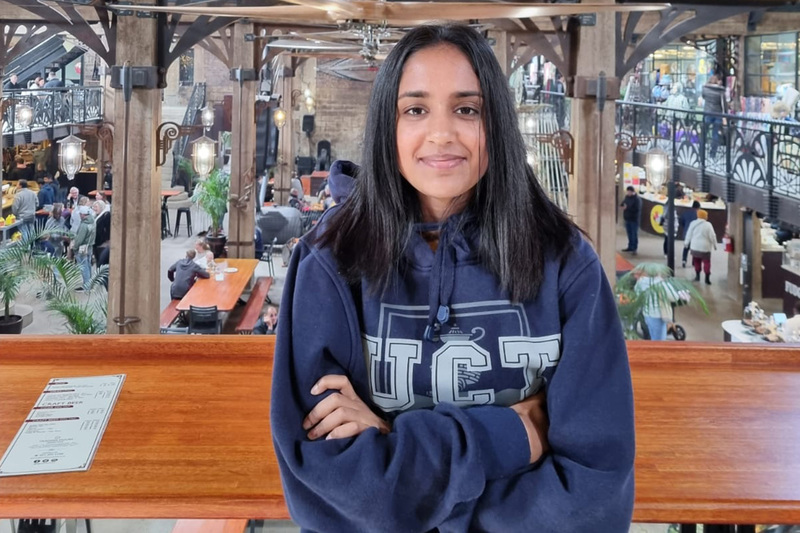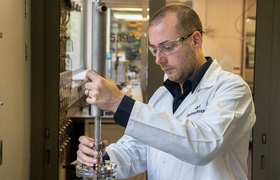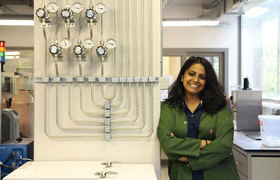A journey from the lab to the stove
06 August 2025 | Story Lyndon Julius. Photos Supplied. Read time 8 min.
As a third-year chemical engineering student, Samishka Govender’s problem-solving does not stop when lectures end. This winter, she has swapped theory for thermal analysis as part of an internship with Hydrogen Energy Applications (HYENA), a University of Cape Town (UCT) spin-off company developing hydrogen-based energy solutions.
Govender’s work focuses on HYENA’s renewable cooking gas product – a green liquefied fuel gas (gLFG) – in a series of real-world cooking trials designed to compare its performance with conventional liquid petroleum gas (LPG).
“We’re testing indicators like smell, off-gas, fuel use, and cooking time – all benchmarked against national safety and performance standards,” she explained. “If gLFG performs just like LPG but with fewer emissions, it becomes a cleaner and potentially more affordable energy option. That’s the goal – accessible, sustainable energy for more South Africans.”
Her road to HYENA began long before the internship. In her first year, she connected with Jack V Fletcher on LinkedIn, her current supervisor. By her third year, she had developed a solid understanding of the company’s work and reached out to enquire about opportunities for involvement.
As we celebrate Women’s Month, Govender’s story highlights the impact of women in engineering, breaking barriers and driving sustainable innovation in fields where they remain underrepresented.
A perfectly energised match
Inside HYENA’s research and development (R&D) environment, Govender has been able to connect academic concepts to practical challenges.
“There’s often a misconception that chemical engineering is just theory,” she said. “But this experience has shown me how much of our degree is about developing critical thinking and engineering literacy. The lab reports and design projects at UCT prepared me for this.”
She has been involved in analysing cooking data, making technical recommendations, and operating equipment such as thermocouples and reactors. The shift from classroom to real-world systems has demanded greater independence, something she’s embraced.
“Engineering isn’t about being spoon-fed. It’s a team sport.”
“A lot of the learning has come from having to work independently. It’s different from a lab course where everything is guided. Here, I’ve had to set things up, make decisions, and know when to ask for feedback. That’s been a valuable shift.”
She believes that engineering, at its core, is collaborative and practical. “Engineering isn’t about being spoon-fed. It’s a team sport, and you grow the most when you’re trusted to figure things out and contribute meaningfully.”
It’s a mindset that aligns closely with the spirit of UCT’s research-led education model: empowering students to think independently, act boldly, and engage with the world beyond the classroom.
The spark that ignited her pathway
The internship has also given her insight into what kind of engineering work she finds most fulfilling. Through her involvement with gLFG testing and technical evaluation, she’s developed a keen interest in R&D.
“Before HYENA, I had a broad sense of the field,” she said. “Now I know I’m drawn to the kind of work that allows you to problem-solve, test, and improve systems. There’s a creativity to it that I really enjoy.”
She views hydrogen-based energy as an ideal area for chemical engineering graduates to make a noteworthy and impactful contribution.
“It’s not just clean – it’s a chemical engineering problem at its core,” she explained. “It brings together thermodynamics, catalysis, and system design, but it also relies on human judgment and creative thinking. You can’t automate your way through this work.
“Whether I’m doing calculations, writing up results, or troubleshooting, I can draw a direct line back to my coursework.”
Learning in a lean environment
Working at a startup like HYENA has added another layer to her learning. Compared to large industrial players, she’s found the experience to be more hands-on and less constrained by rigid structures.
“Start-ups trust you, challenge you, and give you the space to learn quickly,” she explained. “At a bigger company, you might be following instructions or shadowing someone. Here, you’re contributing directly.”
That level of involvement has helped her think differently about her future career. While many students aim for established corporates, she encourages others to consider research-led opportunities with UCT spin-offs and similar innovation-driven companies.
“It’s a completely different kind of learning,” she said. “You’re exposed to both the technical side and the thinking behind product development, safety testing, and even regulation. That kind of holistic understanding is something I value.”
A future shaped by innovation
Govender said her time at HYENA has confirmed her interest in pursuing a career that centres on innovation and sustainability. While she’s gained practical experience with hydrogen-based fuels, the broader lesson has been about using engineering to solve real-world problems.
“I’ve realised I enjoy environments where things are being built, tested, and refined – especially where the work has the potential to make a positive impact.”
With South Africa facing complex energy challenges, she believes research-led education is more important than ever. Internships like this one don’t just offer technical exposure, they cultivate initiative, independence, and a sense of responsibility.
For other UCT students considering similar pathways, her advice is simple: “Start early, be proactive, and don’t be afraid to reach out to people doing work you find interesting. You might be surprised by how willing they are to support and guide you.”
 This work is licensed under a Creative Commons Attribution-NoDerivatives 4.0 International License.
This work is licensed under a Creative Commons Attribution-NoDerivatives 4.0 International License.
Please view the republishing articles page for more information.










